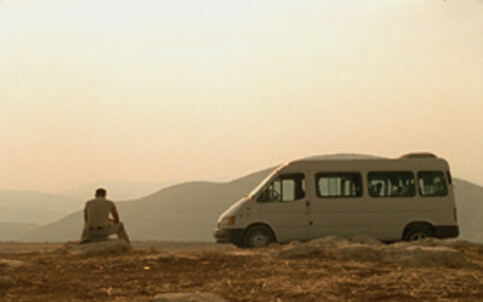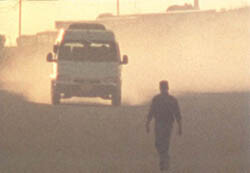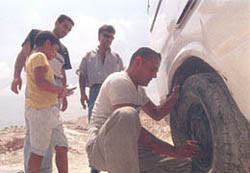The Electronic Intifada 21 July 2003

Hany Abu-Assad’s documentary ‘Ford Transit’, which follows Palestinian taxi-van driver Rajai who tries to live and survive in and around roadblocks separating Ramallah from Jerusalem, won the ‘Spirit of Freedom Award’, dedicated to the memory of Wim van Leer, for best documentary at the 20th annual Jerusalem Film Festival.
The festival’s host, the Jerusalem Cinematheque, joined forces with the Cinema Project, operated by the Tel Aviv’s Rabinovich Foundation and with the commercial broadcaster Keshet in a new initiative, whose purpose is to encourage filmmaking on human rights and freedom.

The Fords, as everyone seems to familiarly call them, are leftover, U.S.-supplied police vehicles that Israel passed on to Palestinians when they were too old to be reliable anymore. The stark white hulks swarm over the territories picking up professional men in suits, waiters in bowties, religious leaders in full garb, old matrons in headscarves, singing kids wearing face paint in the red, green, black and white of the Palestinian flag.

The passengers in the van, the places he gets to and the activities he explores besides driving a taxi conjure up a divers image of the situation and Rajai himself. But by constantly staying with him - the other people talking are always in the van or directly involved with it - the viewer slowly gets a better understanding of the complexity of Rajai’s life. Some passengers insist they’re politically aloof, but many have strong opinions to share, which is partly the point of sitting in the Ford Transit with a camera.
In stead of analysing the situation from afar, Hany Abu-Assad succeeds to undergo it at the hand of someone there. Someone who tries to build up a meaningful existence in the extreme situation he finds himself in, exposed to extreme influences and political turmoil.

Hany Abu-Assad’s documentary ‘Ford Transit’ already received awards at IDFA 2002, Sundance 2003, FIPRESCI Award Thessaloniki 2003, Human Rights Watch, and Karlovy Vary. The Fords portrayed in ‘Ford Transit’ form a backdrop to another award-winning film by Abu-Assad, “Rana’s Wedding”.
Over 200 films were screened in the festival over seven days and at seven different screening venues in the city. Nearly 70,000 viewers participated in the festival as per the organising committee.
Related Links:



